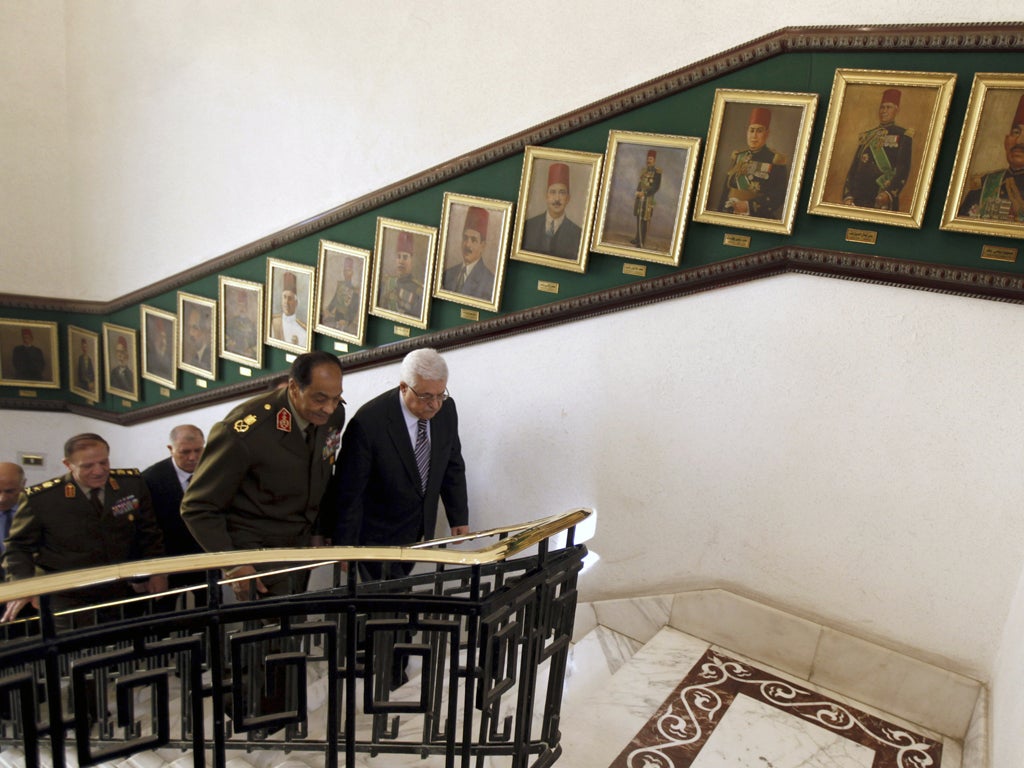Palestinian rapprochement leaves Israel unimpressed
As Fatah and Hamas bury some of their differences, Tel Aviv says the move is a step back towards terror

Your support helps us to tell the story
From reproductive rights to climate change to Big Tech, The Independent is on the ground when the story is developing. Whether it's investigating the financials of Elon Musk's pro-Trump PAC or producing our latest documentary, 'The A Word', which shines a light on the American women fighting for reproductive rights, we know how important it is to parse out the facts from the messaging.
At such a critical moment in US history, we need reporters on the ground. Your donation allows us to keep sending journalists to speak to both sides of the story.
The Independent is trusted by Americans across the entire political spectrum. And unlike many other quality news outlets, we choose not to lock Americans out of our reporting and analysis with paywalls. We believe quality journalism should be available to everyone, paid for by those who can afford it.
Your support makes all the difference.A breakthrough agreement between Fatah, Hamas and other radical groups that could unify all Palestinian factions under a single political umbrella was yesterday greeted with scorn by Israeli officials, who said it marked a step away from peace and back towards terror.
Following talks in Cairo with the Hamas leader, Khaled Meshaal, and the Islamic Jihad leader, Ramadan Shallah, the Palestinian President and leader of the Palestinian Liberation Organisation, Mahmoud Abbas, announced that a joint committee with representatives of all the groups would meet in Amman on 12 January to prepare for elections to the Palestine National Council, the ruling plenary body of the PLO.
It may take years to convene the PNC, but presidential and parliamentary elections in the Palestinian Authority have tentatively been set for May.
The agreement formally ends a 20-year stand-off in which Hamas and Islamic Jihad refused to join the Fatah-dominated PLO or participate in any peace talks that recognised Israel's right to exist. After boycotting elections to the Palestinian Authority because of its opposition to the Oslo peace accords, Hamas created a political party called Change and Reform that won the 2006 election. In 2007, Hamas evicted Fatah from the Gaza Strip in a bloody coup, setting up its own regime and ushering in a period of total division between Hamas-controlled Gaza and the Fatah-controlled West Bank.
Since then, peace talks have been effectively stymied by the fact that Mr Abbas could not claim to represent the Palestinian people as a whole. As a result, Israel has taken advantage of the internal Palestinian stalemate,
Fatah and Hamas have held several rounds of unity talks and even reached a draft agreement in 2009, but Hamas pulled out at the last minute. The Arab Spring, however, has driven both sides to move towards resolving their differences.
Hamas has been weakened by events in Syria which threaten to topple its patron, President Bashar Assad. Fatah, meanwhile, is under pressure from the public to finally unite the Palestinian territories, produce a peace deal with Israel and mend bridges with Hamas.
Israeli officials were far from enthusiastic about the rapprochement between the various Palestinian factions.
"Hamas is not a political movement that resorts to terrorism but a group whose whole vocation is terrorism," said Mark Regev, a spokesman for the Israeli Prime Minister Benjamin Netanyahu. "The closer President Abbas moves to Hamas, the further he moves away from peace," he said. "This is a movement that is terrorist to the core."
Khaled Abu Toameh, a Palestinian commentator, said the agreement by Hamas to join the PLO did not necessarily mean they had finally accepted the idea of peace with Israel. He said the Islamic resistance group had outsmarted Fatah before.
"Joining the PLO does not mean Hamas will necessarily change its strategy or give up on armed struggle, and its leaders have made contradictory statements on those issues while these talks have been going on," Abu Toameh said. "They ran in the 2006 election held under the Oslo peace accords but still refused to recognise the accords."
"They are effectively coming into the PLO without making any concessions. They have beaten Fatah before and they could do it again, replacing Fatah as the largest faction. Then the whole PLO will have to change and everything will be up for grabs."
Join our commenting forum
Join thought-provoking conversations, follow other Independent readers and see their replies
Comments